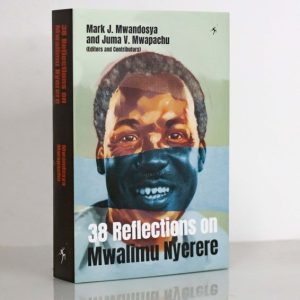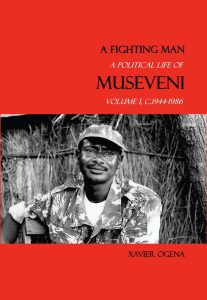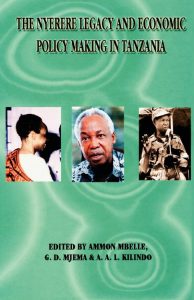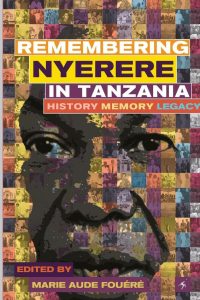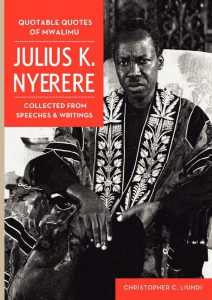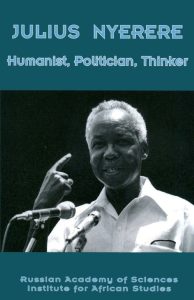Publisher: Mkuki na Nyota Publishers, Tanzania
Pages: 448
Year: 2022
Category: Biography & Memoir, Leadership, Political Biography, Politics
Dimensions: 230 x 150
Now avaialable in hardback, the novelty of this book is in the choice of individuals selected to be interviewed, the kinds of probing questions asked, and the quality of the conversations held. These led to the disclosure by the interviewees of details that would not normally have been known about Mwalimu. The individuals selected had each worked closely or lived with Mwalimu and, we believed, had unique insights and perspectives to share about him. It was an approach that we think evoked candid anecdotes that constitute the chapters of this book.
“He detested senseless and unmitigated loss of human life. I recall
his conversation with Mzee Abeid Amani Karume in 1964. Mwalimu told him,
“Sheikh, now that your revolution has been successful, and you are in
power, please do not kill people, don’t kill, please don’t kill”. Karume
responded, “Mwalimu, I understand what you are saying. However, some
people are difficult to deal with”. Mwalimu insisted again, “No, No, No,
don’t kill your citizens, don’t kill people.”– Joseph Butiku
Mwalimu once told me, “Cleopa, if I were to become president again, I
am sure we could do a lot of things”. When I asked him why, he said, “I
have learnt one important lesson. Wherever I have gone, I have been
reminded that you can’t have a good philosophy, idea or theory to
restructure a society if that philosophy, idea or theory is not
translated into the tummy, bread and butter.”– Cleopa Msuya
“Before knowing Mwalimu closely, I had heard from some people that
Mwalimu was a dictator. I discovered that the perception was false. At
meetings, Mwalimu allowed maximum space and freedom to air views and to
debate. Mwalimu was a good listener. Mwalimu made people feel free to
speak out. We respected him.”– Seif Sharif Hamad
“It is a gigantic task to reflect on and write about Mwalimu Julius
Kambarage Nyerere. How can one do justice to the remarkable leader and
teacher that Mwalimu was? Even a year would not be enough to cover all
aspects of the life and times of Mwalimu Nyerere, and the immense
contribution he made to humanity; the man who Yoweri Kaguta Museveni,
President of Uganda has described as, ‘the greatest black man that has
ever lived’.” reflections.– Mark J. Mwandosya
In the period between 1994 and 1996, I saw a man who was angry,
disappointed and openly vocal about what he perceived as the erosion of
ethical governance and entry of corruption in high office at that time.
Mwalimu’s speeches to the Tanzania Press Club in Dar es Salaam on 14
March 1995 and at the ‘Mei Mosi’ (Labour Day) event in Mbeya on 1 May
1995 reflected grave concerns about the erosion of society’s values. He
said it was as if the values had been struck by an earthquake. He even
boldly talked about the State House being abused; turned into a ‘den of
corruption’.– Juma V. Mwapachu
“Mwalimu was a very humble man. He had a strong faith in Catholicism
and went to church every morning. He rejected pomp; he was a simple man.
He refused long motorcades. He limited the vehicles in his presidential
motorcade to four. He discouraged stopping people on the road to allow
presidential cars to pass. He hated the routine.”– Mark Bomani
“I learned two things about Mwalimu. The first was that he was a
master media manager, a quality some other contemporary leaders could
well emulate. He spoke to journalists on his terms when he had something
to say. Interminable lectures and harangues were not his style. The
second point was that you gave Nyerere ultimatums at your own peril. His
logic was disarming; his determination both forceful and occasionally
somewhat chilling.”– David Martin
“Mwalimu consistently preached about the importance of human dignity.
He was not one of those politicians who did the opposite of what they
preach. He walked the talk. He was a man who sincerely believed that all
human beings are equal as creations of Almighty God.” – Anna Mwansasu
“Mwalimu’s children were brought up to appreciate that they were just
like any other Tanzanian children. He never wanted them to feel or
appear special. In this aspect, therefore, he was very different from
other African leaders. He was utterly selfless as an individual and as a
leader.”– Maria Kamm
“If Mwalimu Julius Nyerere was to be identified with just one cause
to the exclusion of any others; that cause would be the fight for man’s
emancipation and liberty, the total and unconditional opposition to all
forms of domination and subjugation.”– Jenerali Ulimwengu
“What comes out from my experience with Mwalimu is his continuous use
of power and authority even when he was outside the government and CCM.
He enjoyed a lot of respect for his leadership. He was listened to. His
iconic stature and charisma were beyond description.”– Pius Msekwa
“Mwalimu Nyerere hated corruption in all its manifestations. He
believed that people had the right to change and, if need be, overthrow a
corrupt and therefore unaccountable government.”– Job Lusinde
“Mwalimu Nyererre kept his distance from hypocritical people.”
– Ibrahim Kaduma
“His monumental achievements for Tanzania and the people of southern
Africa, and indeed beyond, cast into insignificance whatever errors
Mwalimu might have committed as a human being.”– Kenneth Kaunda
“I would simply say that Julius Nyerere was completely free of fear –
fear of what people may think of him or putting on an image to the
world as if he was saying to the world, ‘this is who I am.”– Devaki Jain
Price range: £27.00 through £34.00

